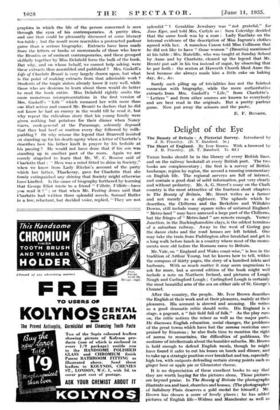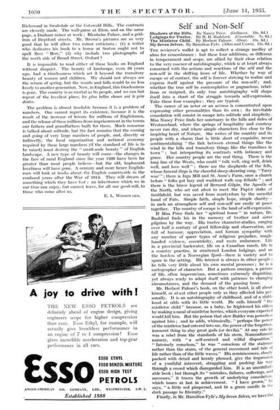Delight of the Eye
THESE books should be in the library of every British liner, and on the railway bookstall at every British port. The two books are complementary ; the first is a survey of British landscape, region by region, the second a running commentary on English life. The regional surveys are full of interest, and contain a good deal of solid information, put very clearly and without pedantry. Mr. A. G. Street's essay on the Chalk country is the most attractive of the fourteen short chapters in The Beauty of Britain. Mr. Street writes as a farmer and not merely as a sightseer. The uplands which he describes, the Chilterns and the Berkshire and Wiltshire Downs, still include 'many square miles of untamed England. " Metro-land " may have annexed a large part of the Chilterns, but the fringes of " Metro-land " are remote enough. Verney Junction, in the Buckinghamshire clays, is the oddest terminus of a suburban railway. ' Away to the west of Goring gap the dance clubs and the road houses are left behind. One may take the train from Paddington after breakfast and get in a long walk before lunch in a country where most of the monu- ments were old before the Romans came to Britain.
Mr. Vale, on " England and Wales coast-wise," is less in the tradition of Arthur Young, but he knows how to tell, within the compass of thirty pages, the story of a hundred inlets and harbours. With so much matter it may seem ungracious to ask for more, but a second edition of the book might well include a note on Northern Ireland, and pictures of Lough Neagh and Carlingford Lough ; Carlingford Lough is certainly the most beautiful arm of the sea on either side of St. George's Channel.
After the country, the people. Mr. Ivor Brown describes the English at their work and at their pleasures, mainly at their pleasures. His account is shrewd and amusing. He writes as a good dramatic critic should write. His England is a stage, a pageant, a " fair field full of folk." As the play runs on, the critic notices the minor as well as the major parts. He discusses English education, social changes, the problems of the great towns which have lost the summa rusticitas once praised by Erasmus ; he also finds time to mention the right of access to mountains; the difficulties of publieans, the snobisine of intellectuals about the humbler suburbs. Mr. Brown is bold enough to defend English meals, though he might have found it safer to cut his losses on lunch and dinner, and to take up a strategic position over breakfast and tea, especially high tea, with outposts defending certain strong points such as ginger beer or apple pie or 'Gloucester cheese.
It is no depreciation of these excellent books to say that they are worth buying for the pictures alone. Those pictures are beyond praise. In The Beauty of Britain the photographs illustrate sea and land, churches and houses. (The photographer of Salisbury Plain deserves a gold medal for himself.) Mr. Brown has chosen a score of lovely places ; he has added pictures of English life—Widnes and Manchester as well as
Richmond in Swaledale or the Cotswold Hills. The contrasts are cleverly made. The wall-game at Eton, and on the same page, a Durham miner at work ; Blenheim Palace, and a grid- iron of Deptford streets. Mr. Brown's pictures are so very good that he will allow two minor criticisms : (1) a writer who dedicates his book to a house at Seaton ought not to Spell Beer " Bere," (2) why include two photographs of the north side of Broad Street, Oxford ?
It is impossible to read either of these books on England without disquiet. The beauty of landscape, even 30 years ago, had a timelessness which set it beyond the transitory beauty of women and children. We should not always see the return of spring, but the woods and hills would be no less lovely to another generation. Now, in England, this timelessness is gone. The country is as mortal as its people, and we can but repeat of the loveliest place, les plus belles closes ont is pine destin.
The problem is almost insoluble because it is a problem of numbers. One cannot regret its existence, because it is the result of the increase of leisure for millions of Englishmen, and the release of these millions from imprisonment in the towns our fathers and grandfathers built for them. Much nonsense is talked about solitude, but the fact remains that the coming and going of very large numbers of people, and, directly or indirectly, the local organization and national economy required by these large numbers (if the standard of life is to be raised) must destroy the " small-scale beauty " of English landscape. A new type of beauty will come—the changes in the face of rural England since the year 1200 have been far greater than most people believe—but the old, haphazard loveliness will have gone. A century and more hence English- men will look at books about the English countryside in the confused years after the War of 1914. They will dream of something which they have lost ; an inheritance which we in our time can enjoy, but cannot leave, for all our good-will, to those who come after us.
E. L. WOODWARD.



















































 Previous page
Previous page